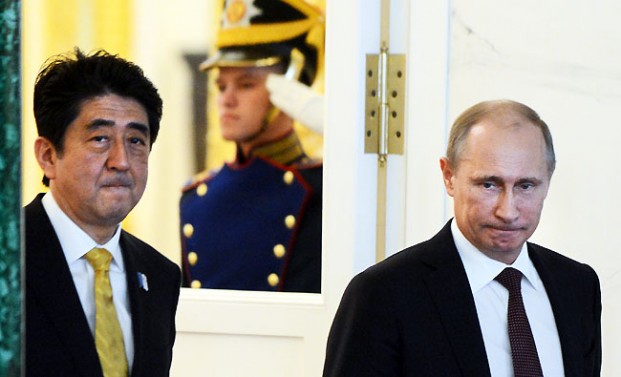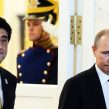
The Crisis in Ukraine Claims Another Victim: Russo-Japanese Rapprochement
Publication: Eurasia Daily Monitor Volume: 11 Issue: 104
By:

The Ukrainian crisis has apparently claimed another victim, namely Russo-Japanese rapprochement. This rapprochement, which began after Shinzo Abe’s rise to power in Tokyo, offered clear signs of a new attempt to overcome the long-standing dispute over the Kuril Islands (known in Japan as the Northern Territories) between Moscow and Tokyo and normalize bilateral relations. Indeed, as part of the gradual warming of relations championed by both Prime Minister Abe and President Vladimir Putin, the Russian head of state was supposed to make an official visit to Japan this fall (Jiji Press, February 8). However, all that now seems off the table, largely due to the crisis generated by Moscow’s annexation of Crimea and its continuing efforts to destabilize eastern Ukraine.
Due to the annexation of Crimea, Japan followed the United States and Europe in imposing sanctions on Russia (RIA Novosti, ITAR-TASS, April 29). But its sanctions were clearly imposed reluctantly and more passively than those passed by Washington, and foreign observers noted this reluctance (Global Times, April 4). This was clearly due to Tokyo’s concerns over undermining the rapprochement process and associated ventures such as Russian energy deals for Japan. Nonetheless, it has become obvious that Japan is no longer considering holding talks with Russia over the fate of the Kuril Islands. Putin, for his part, professed to be surprised at Japan’s sanctions and blamed them, predictably on Tokyo. He also proclaimed that Russia is still ready to enter into such discussions, but he doubted Japan’s readiness to do so. And, indeed, the Japanese press had earlier corroborated that those issues were not presently on the table (Asahi Shimbun, May 25; Voice of Russia, Reuters, May 24; Kyodo World Service, May 9). Thus, the crisis in Ukraine clearly has directly contributed to the likely suspension, if not breakdown, of warming Russo-Japanese ties.
The Ukraine crisis contributes to the breakdown of the rapprochement process in other ways as well—and it is also apparent for the outcome of Putin’s recent trip to China. Undoubtedly, Tokyo fully grasped that Moscow and Beijing are close partners, but Ukraine’s impact upon Russian foreign relations with the West has driven it even closer to China (see EDM, May 22). The results of that trip are, therefore, likely to be discomfiting for Tokyo.
In the Chinese case, the huge energy deal made with Beijing—which Russia so desperately needs—is particularly likely to preclude a deal of any magnitude to supply Japan, given the strength of the “China lobby” in Moscow. Therefore, incentives to cooperate with Moscow to gain energy are likely to become much harder for Tokyo to accomplish. This also applies to the new proposal by several Japanese legislators to build a new pipeline from Sakhalin to Japan’s northernmost islands Hokkaido and Honshu—a deal that Japan urgently needs as an alternative to nuclear energy following the 2011 Fukushima accident (RIA Novosti, May 28). Apart from cost and other usual issues affecting pipelines, one can expect China to try and block such a deal.
Moreover, Putin and Chinese President Xi Jinping’s calls to establish a new Asian security system as well as remarks about the two countries’ shared views on historical issues dating back to World War II certainly do not contribute to Russo-Japanese rapprochement (kremlin.ru, May 20, 21; Jiji Press, May 20). By the same token, the Russo-Chinese naval exercises that began at the same time as Putin’s visit to China added further to Japanese anxieties. Even though both countries claimed these exercises were not directed against any third party, the Hong Kong paper Wen Wei Po reported on May 21 that the naval drills were designed to enhance the preparedness of the People’s Liberation Army Navy (PLAN)—if not also Russia’s fleet—for potential military confrontations in the East China Sea against Japan, and in the South China Sea. Thus, the joint Sino-Russian exercises served as a warning to the United States, Vietnam, the Philippines and Japan (Wen Wei Po Online, May 21). Further evidence favoring this view emerged in the Korean media, which noted that the territory of these exercises overlapped with South Korean airspace (Hankoryeh Online, May 21)
Such actions contribute further to the already strong Japanese apprehensions about Sino-Russian relations and the fear that China could exploit the Crimea crisis to strengthen its position vis-à-vis Russia (Jiji Press, May 20; Political and Defence Weekly [New Delhi], April 1–7). Indeed, Abe warned that the Crimean crisis could have repercussions in Asia (Jiji Press, May 20). Furthermore, high-handed Russian actions—like closing the Sea of Okhotsk to Japanese fishermen or the daily overflights through Japan’s airspace by Russian fighters and bombers that are recounted daily in the Japanese press—show that Moscow does not truly take Japan seriously as a partner (see EDM, April 29).
When combined with the Ukraine crisis’s impact on already precarious Russo-Japanese relations, the apparent recent breakdown of the bilateral rapprochement process appeared almost predetermined. Neither side gains by this, however. Tokyo’s apprehensions about Beijing are now greater since this rapprochement with Moscow has broken down. Whereas, Russia’s dependence on China and the Russian inability to devise a partnership on any substantive issue with Japan also restrict Moscow’s freedom of action in the Asia-Pacific region. This will make Russia’s quest for independent great power status there more difficult to obtain. Thus, whatever gains Moscow feels it may have made in Crimea, it is already paying for them in Asia.




